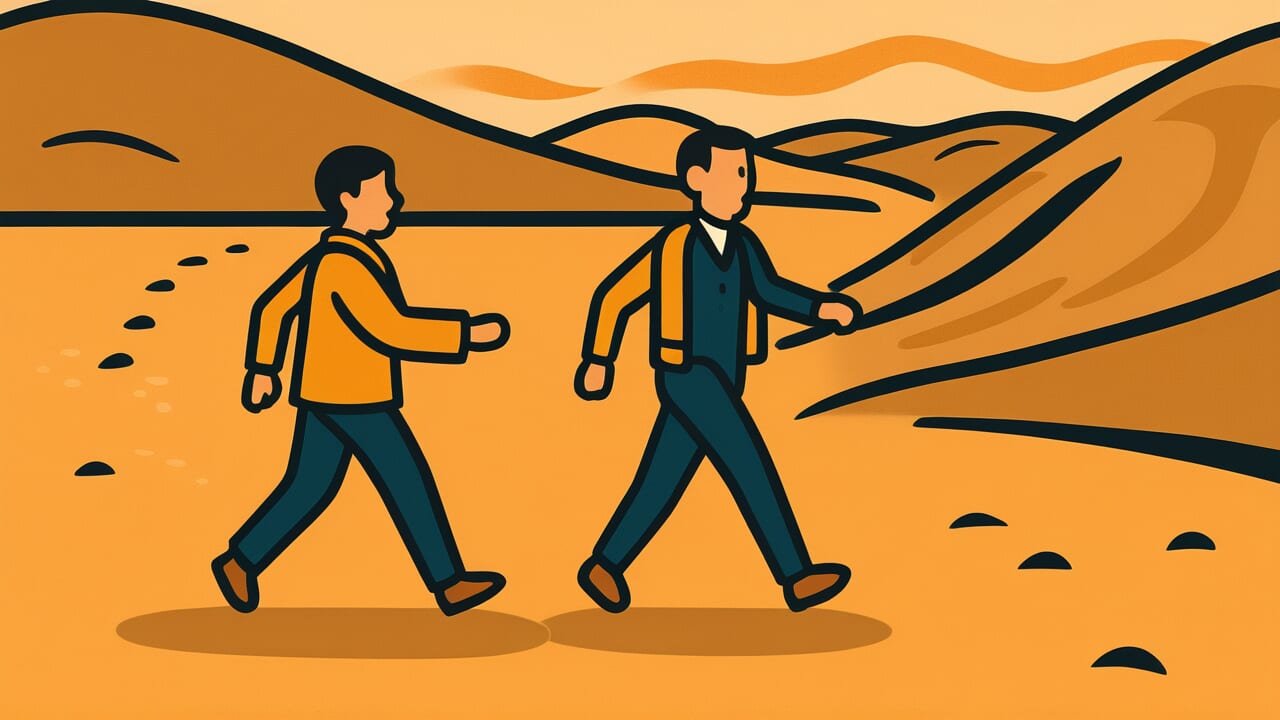How to Read “Walk three miles in the sand and you go back two miles”
Sunahara wa sanri yukeba niri modoru
Meaning of “Walk three miles in the sand and you go back two miles”
This proverb means that in difficult situations, things don’t progress as you hope. Even when you think you’ve moved forward, you sometimes fall back.
Like walking on sand, it describes situations where your efforts don’t produce the results you expected. Or when you think you’ve made progress, only to return to where you started.
People use this saying when recovering from illness with ups and downs. When trying to improve finances but seeing little change. When learning or training but progress seems invisible.
This expression captures more than just “not moving forward.” It conveys the double difficulty of working hard yet also sliding backward.
It accurately describes situations where forward momentum exists alongside resistance that holds you back. Today, we still use these words when projects advance then hit problems requiring rework. Or when working toward goals but unexpected obstacles force you backward.
Origin and Etymology
The exact first appearance of this proverb in literature is unclear. However, it clearly came from the experience of walking on sandy ground.
Anyone who has walked on sand dunes or beaches immediately understands this saying. With each step on sand, your foot sinks in and sand crumbles backward.
You desperately try to move forward, but sand slides back under your feet. Your actual forward distance becomes much shorter than the distance you walked.
The expression about walking three miles but sliding back two miles, ending up only one mile ahead, perfectly captures this sandy walking experience in numbers.
People in old times actually experienced this difficulty when traveling along coastlines or through sandy regions.
Japan’s geography likely influenced this expression’s creation. As an island nation, Japan offered many opportunities to walk on beaches.
Volcanic ash deposits also created sandy soil in some regions. Real experiences in these environments became metaphors for life’s difficult situations. Eventually these metaphors settled into proverbs.
Interesting Facts
Science actually proves the difficulty of moving on sand. Walking on sand makes humans consume about twice the energy compared to walking on normal ground.
This happens because sinking feet lose most of their forward push. Plus, unstable footing requires extra muscle power for balance.
The ratio this proverb shows—”walk three miles and go back two”—isn’t an exaggeration at all. It may actually match the real physical experience quite closely.
Usage Examples
- Three years since starting my business, it’s been like “Walk three miles in the sand and you go back two miles,” but things are finally getting on track
- Rehabilitation feels like “Walk three miles in the sand and you go back two miles,” so recovery will take longer than expected
Universal Wisdom
This proverb teaches us a deep truth. Progress in life never follows a straight line. We often want to believe that effort guarantees forward movement. But reality isn’t that simple.
When humans face difficulties, the hardest moment comes when effort feels wasted. What you carefully built crumbles and pushes you back to the starting point.
This repetition can break your spirit. Our ancestors deeply understood this human struggle. That’s why they left us these words.
But think carefully. Even if you walk three miles and slide back two, you definitely moved forward one mile.
This proverb isn’t just a lament. Rather, it contains hope. It tells us that continuing to walk through difficult situations, even slowly, still moves us forward.
Human endeavors may essentially work this way. Smooth progress in perfect conditions is rare. Most often, we move forward bit by bit through unfavorable conditions, experiencing setbacks along the way.
When you can accept this reality, perhaps that’s when you gain true strength.
When AI Hears This
When walking on sand, particles crumble with each step. This isn’t just a physical phenomenon. It’s the law of entropy increase that governs the universe, unfolding right before your eyes.
Entropy measures “the degree of disorder.” In the universe, things always move toward increasing entropy. Order naturally collapses and scatters. That’s the universe’s fundamental principle.
When you step on sand, you’re trying to create temporary “order” beneath your foot. You’re compressing sand particles to make a structured foothold.
But sand particles have little friction between them. They follow gravity and flow downward to lower positions. This is entropy increase.
The moment you lift your foot, sand crumbles back to its original disordered state. This return creates the sensation of “going back two miles.”
Interestingly, this effect becomes more pronounced with smaller, drier sand grains. Finer particles have less contact area, lowering the friction coefficient.
Then sand becomes more fluid, and entropy increases faster. Nature’s disorder overwhelms human effort and energy input. This creates the physical sensation of “not moving forward.”
Lessons for Today
Modern society values instant results and efficiency. When results don’t come quickly, we get anxious. We doubt whether our efforts are wrong. But this proverb offers a different perspective.
What matters is understanding from the start that setbacks will happen. When dieting, weight fluctuations aren’t failures. They’re part of the process.
When learning new skills, what you could do yesterday might not work today. That’s also natural.
With this understanding, temporary setbacks won’t disturb your mind. You can maintain a long-term perspective. Walk three miles and slide back two, but you definitely moved forward one mile. That accumulation is real growth.
If you’re in a situation now where things won’t progress as you wish, maybe you’re walking on sand. But that’s okay.
Each step may be small, but continuing to walk will definitely move you forward. Don’t fear setbacks. Don’t rush. Keep walking at your own pace.
Because the path is difficult, the view when you arrive will be extraordinary.



Comments